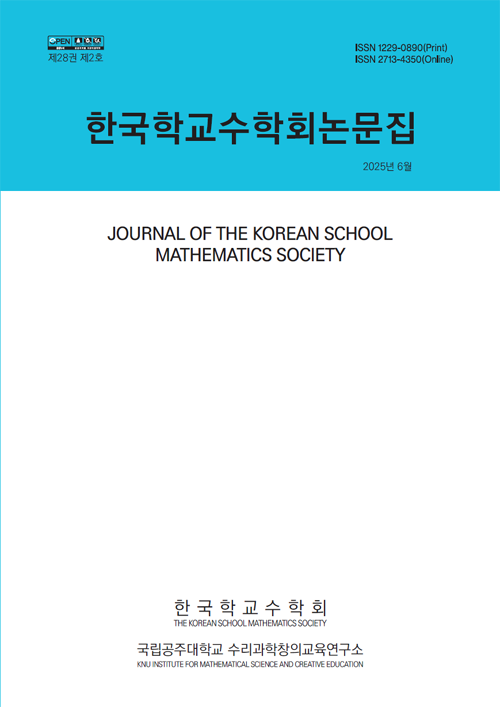- 영문명
- Effectiveness analysis of AI-based educational technology tools
- 발행기관
- 한국학교수학회
- 저자명
- 황지현(Jihyun Hwang) 이예찬(Yechan Lee) 김승현(Seung-Hyun Kim) 이주연(Juyeon Lee) 이완희(Wan Hui Lee)
- 간행물 정보
- 『한국학교수학회논문집』제28권 제2호, 143~162쪽, 전체 20쪽
- 주제분류
- 사회과학 > 교육학
- 파일형태
- 발행일자
- 2025.06.30
무료
구매일시로부터 72시간 이내에 다운로드 가능합니다.
이 학술논문 정보는 (주)교보문고와 각 발행기관 사이에 저작물 이용 계약이 체결된 것으로, 교보문고를 통해 제공되고 있습니다.

국문 초록
본 연구는 맞춤형 수학교육을 지원하는 인공지능 기반 도구인 『진단수학』을 사례로 인공지능 기반 교육 공학 도구의 효과성을 분석하였다. 『진단수학』은 실시간 피드백, 맞춤형 학습 경로 제공, 오답노트 추천과 같은 기능을 통합하여 교사를 지원하고 학생의 참여를 향상시키는 것을 목표 로 하고 있다. 본 연구는 전통적인 집단 비교 설계 대신, 교수 실행 충실도(Fidelity of Implementation, FOI) 프레임워크와 로직 모형(Logic Models)을 활용하여 인공지능 기반 공학 도구의 활용이 교실 환경에 미친 영향을 평가하였다. 자료 수집은 교사 면담, 학생의『진단수학』사용 기록, 전문가 검토를 통해 이루어졌으며, FOI의 교수학적 효과의 주요 측면을 평가하였다. 연구 결과에 따르면, 『진단수학』은 자동화된 과제 관리, 맞춤형 피드백, 학습 성과 모니터링을 통해 교사의 업무 효율성을 크게 향상시켰다. 교사들은 채점 작업의 간소화로 인해 수업 계획 및 학생 참여 활동에 더 많은 시간을 할애할 수 있었다. 또한, 『진단수학』은 학생의 자율성 증진, 인공지능기반 개별학습 지원 등의 기능을 통해 학생 학습에 긍정적인 영향을 미칠 것으로 기대되었다. 그러나 장기적인 학생 참여를 유지하는 데 어려움이 있었으며, 일부 학생들의 참여도가 시간이 지나면서 감소하였다. 이러한 결과는 학습자의 다양한 요구에 맞춘 지속적인 동기 부여와 적응적 교수 전략의 필요성을 강조하였다. 본 연구는 인공지능 기반 공학 도구 가 명확한 교수 목표에 맞게 설계되고 교실 환경에 맞춰 지속적으로 최적화될 때 교육적 효과가 클 수 있음을 결론지었다. 본 연구는 인공지능 기반 도구의 효과성을 평가하는 새로운 실증적 방법을 교육자와 공학 도구 개발자에게 제시하였다.
영문 초록
This study examined the effectiveness of AI-based educational technology through a case study of JindanMath, an AI-driven tool designed to support personalized mathematics instruction. JindanMath incorporated features such as real-time feedback, personalized learning pathways, and error note recommendations, aimed at enhancing teaching practices and student engagement. The study employed the Fidelity of Implementation (FOI) framework and a logic model to assess how the tool’s design and implementation influenced classroom outcomes, as opposed to using a traditional group comparison design. Data collection included teacher interviews, student usage logs, and a Delphi survey to evaluate key aspects of pedagogical effectiveness. The findings revealed that JindanMath significantly improved teacher efficiency through automated task manage- ment, personalized feedback, and student performance monitoring. Teachers benefited from streamlined grading, which al- lowed more time for instructional planning and student engagement activities. The tool also enhanced student learning by fos- tering autonomy and personalized learning experiences. However, sustaining long-term student participation posed a challenge, as some students showed decreased engagement over time. This finding underscored the importance of ongoing motivation and adaptive instructional strategies tailored to diverse learner needs. The study concluded that AI-based tools like JindanMath could have a profound impact when aligned with clear instructional goals and continuously optimized based on classroom contexts. By offering empirical evidence, this research informed educators and developers of effective practices for evaluating the impact of AI-based tools in educational settings.
목차
Ⅰ. 서 론
Ⅱ. 이론적 배경
Ⅲ. 연구의 배경
Ⅳ. 연구 방법
Ⅴ. 효과성 분석 결과
Ⅵ. 논의 및 결론
참고문헌
키워드
해당간행물 수록 논문
- 한국학교수학회논문집 제28권 제2호 목차
- 역사적·심리적 발달에 따른 선형대수 학습 수준에 대한 고찰
- 2022 개정 수학과 교육과정에서의 중학교 1학년 교과서에 나타난 QR 코드 분석 연구
- 수학교과서의 공역 서술 방법에 따른 역함수의 존재성에 관한 평가 문항 해석 차이: 조각마다 정의된 함수를 중심으로
- 컴퓨터 기반 평가의 문항 유형별 응답 분석: 국가수준 학업성취도 평가 중학교 수학을 중심으로
- 인공지능 기반 교육 공학 도구의 효과성 분석
- 인공지능 기반 지능형 튜터링 시스템을 활용한 초등 수학 수업 설계: 교사의 인식과 실천을 중심으로
참고문헌
관련논문
사회과학 > 교육학분야 BEST
더보기사회과학 > 교육학분야 NEW
- 연쇄적 베이지안 추론을 적용한 학습전략 사용 및 효과 판단의 착각현상 분석
- 중국인 유학생 대상 해결중심 집단상담 프로그램 개발 및 효과 -K대학교 대학원생을 중심으로-
- 일상 속 인성덕목을 반영한 유아인성교육 실천방안에 참여한 예비유아교사의 경험의 의미
최근 이용한 논문
교보eBook 첫 방문을 환영 합니다!

신규가입 혜택 지급이 완료 되었습니다.
바로 사용 가능한 교보e캐시 1,000원 (유효기간 7일)
지금 바로 교보eBook의 다양한 콘텐츠를 이용해 보세요!



